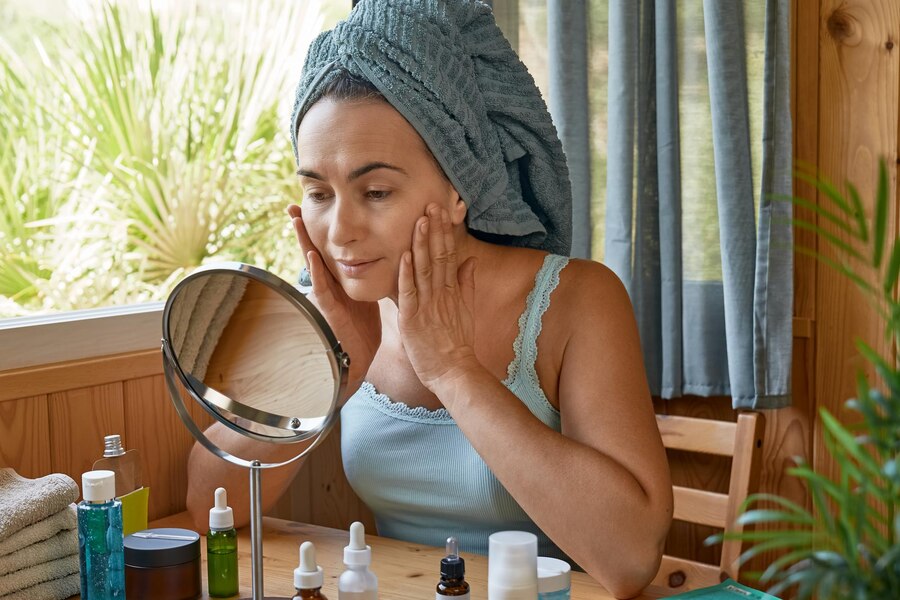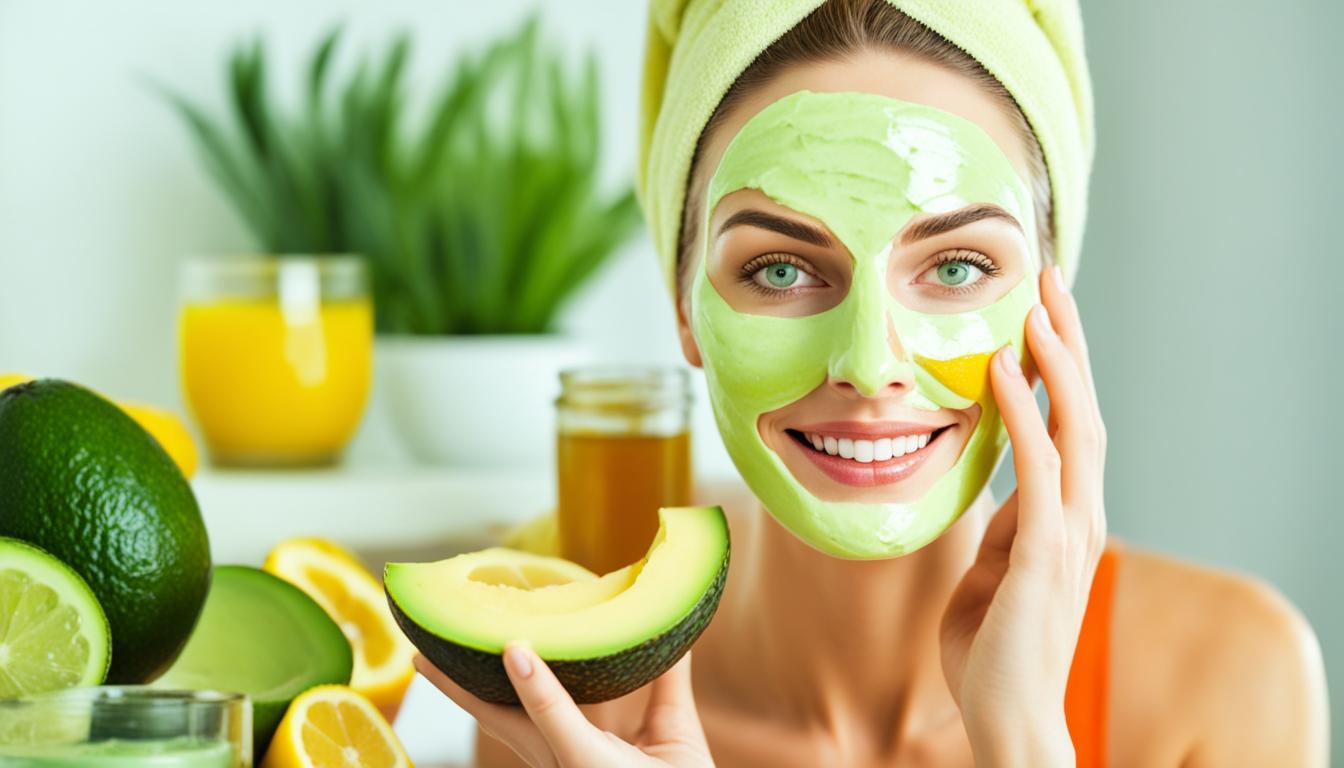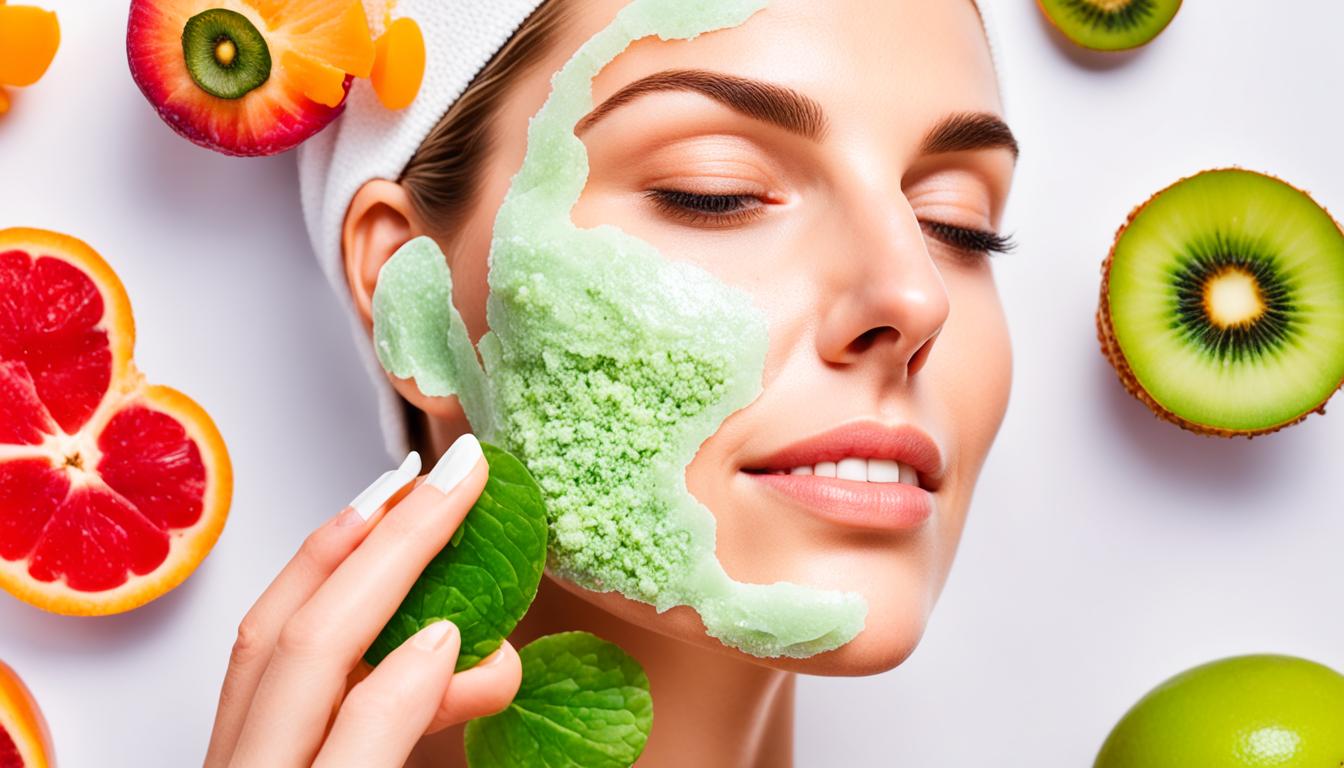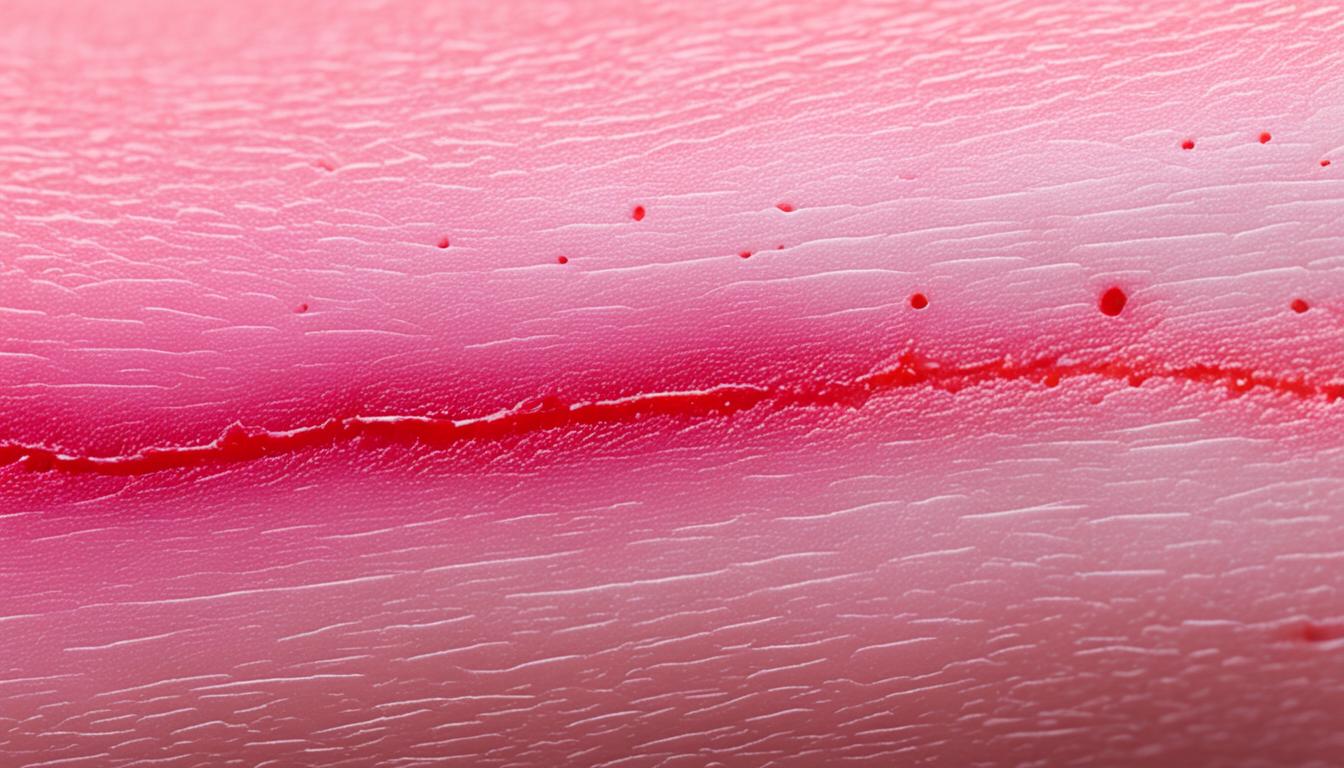What Is Exfoliation And Why Is It Important For Skin?
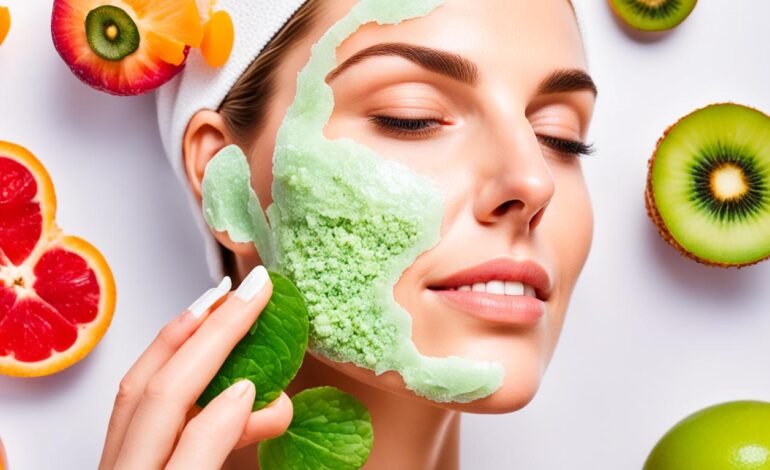
Exfoliation is key to removing dead, dull skin cells. It’s vital for healthy, glowing skin. By getting rid of these cells, exfoliation shows off smoother, brighter skin underneath. This makes the skin look better and feel softer.
Regular exfoliation has many benefits. It helps reduce blemishes and breakouts, increases moisture, and fights aging signs. Adding exfoliation to your skincare routine is important for a young, shining look.
Key Takeaways
- Exfoliation is the process of removing dead skin cells from the surface of the skin.
- Exfoliation is essential for maintaining healthy, radiant skin by revealing the smoother, brighter complexion underneath.
- Regular exfoliation can improve skin’s appearance, minimize blemishes, boost hydration, and combat signs of aging.
- Incorporating exfoliation into a skincare routine is crucial for achieving a youthful, glowing complexion.
- Understanding the benefits of exfoliation is key for maintaining healthy, vibrant skin.
Understanding Skin Exfoliation
Exfoliation is key to keeping our skin healthy and glowing. But what is it, and how does it help our skin? Let’s look into the basics.
What Is Exfoliation?
Exfoliation removes the top layer of dead skin cells from our skin. This makes way for new, healthier cells to show. It helps our skin look brighter and younger.
The Life Cycle of Skin Cells
Our skin renews itself through desquamation. New cells are made in the basal layer and move up to the surface, then shed. As we get older, this process slows down, leaving dry, dull cells on the surface. Exfoliation speeds up this process, showing off the fresh, glowing skin underneath.
Also Read : How Can You Treat Skin Redness At Home?
“Exfoliation helps accelerate the natural skin cell turnover process, revealing the fresher, more radiant skin beneath.”
Knowing how exfoliation works in skin cell renewal helps us see why it’s important for a healthy, glowing look.
Also Read : What Are The Types Of Skin Infections?
Importance of Exfoliation for Healthy Skin
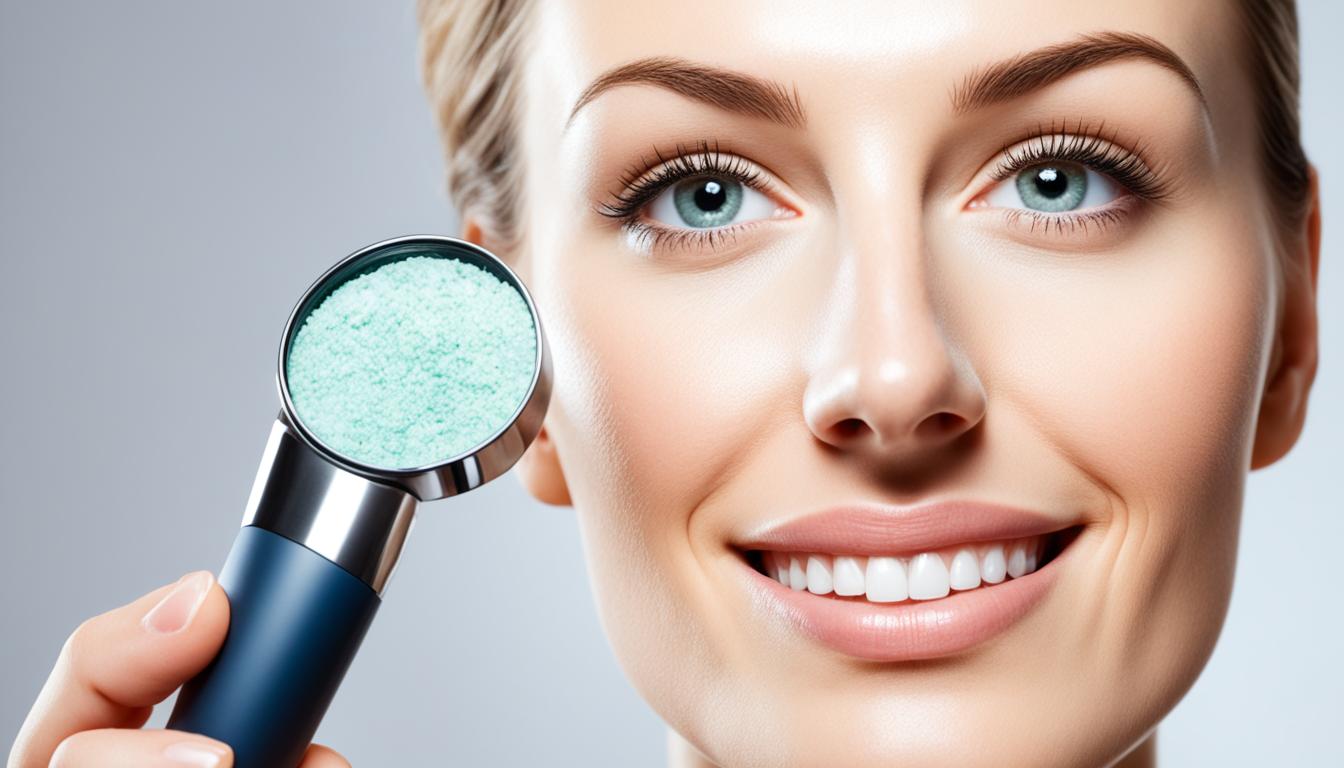
Exfoliation changes the game for a brighter, more radiant look. It removes dead skin cells, showing off the glowing skin underneath. Regular exfoliation minimizes pores, reduces breakouts, and fades dark spots. This makes the skin tone even and youthful.
Also Read : What Ingredients Should You Avoid To Prevent Skin Irritation?
Brighter and More Radiant Complexion
Exfoliation does more than just make the skin look better on the surface. It removes dead skin, letting the skin absorb moisturizers and serums better. This enhances radiance and luminosity. Your skin looks more youthful and healthy.
Also Read : What Are The Best Ways To Prevent Skin Allergies?
Minimizing Blemishes and Breakouts
Exfoliation is key in preventing and minimizing blemishes and breakouts. It gets rid of excess oil, dirt, and impurities in pores. This keeps the skin clear and balanced, lowering the chance of breakouts. It also helps fade existing blemishes, making it a must-have in skincare routines.
Also Read : How Do Antioxidants Protect Skin from Damage?
| Benefits of Exfoliating | Exfoliation and Skin Radiance | Exfoliation and Acne | Exfoliation and Hyperpigmentation |
|---|---|---|---|
|
|
|
|
Adding gentle exfoliation to your skincare routine is key for healthy, glowing skin. It brightens the complexion and minimizes blemishes and breakouts. Exfoliation’s benefits are truly transformative.
Types of Exfoliation
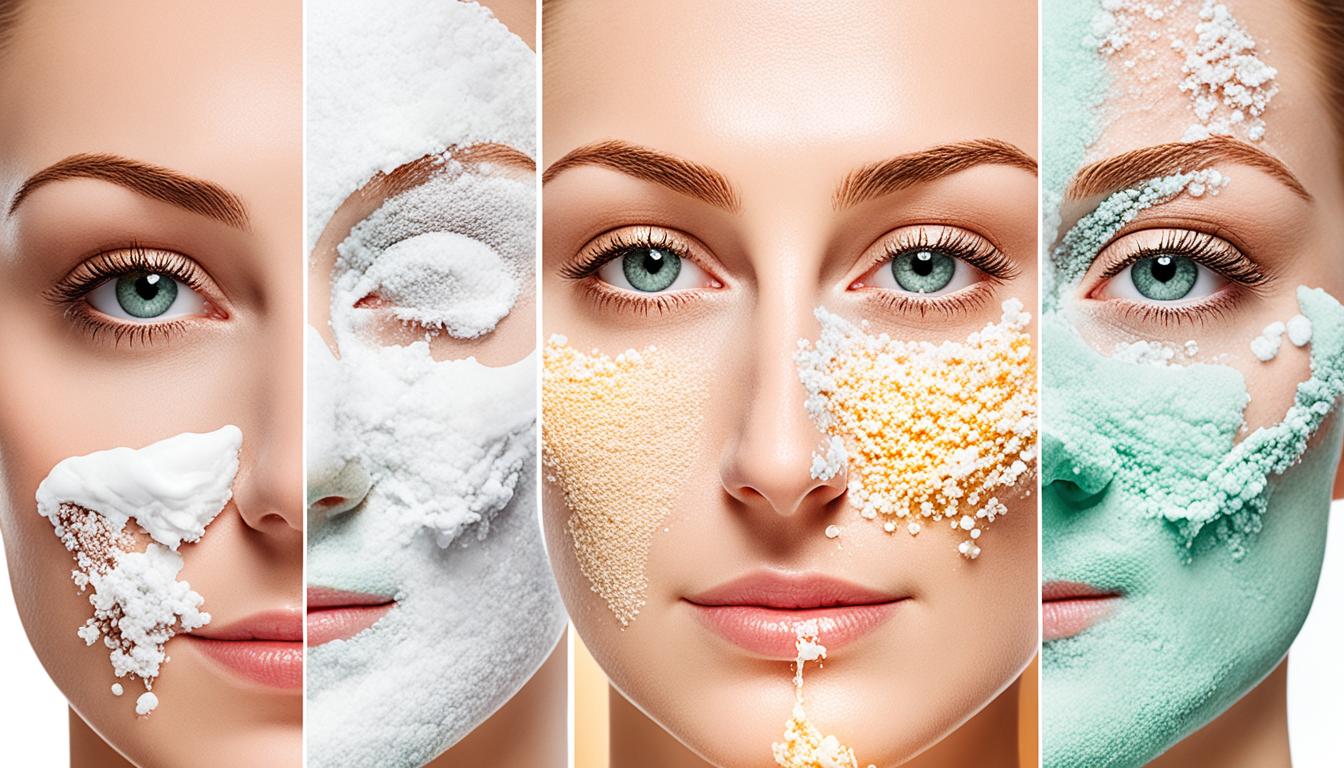
There are two main ways to exfoliate your skin: physical and chemical methods. Each has its own benefits and things to consider. Knowing the differences helps you pick the best one for your skin type and issues.
Physical Exfoliation
Physical exfoliation uses tools or scrubs to remove dead skin cells. You might use facial brushes, gloves, or scrubs with nuts, seeds, or sugar. It can deeply clean and give you a glow, but be gentle to avoid skin irritation.
Chemical Exfoliation
Chemical exfoliation uses acids like glycolic acid and lactic acid, or salicylic acid to remove dead skin cells. These aha exfoliants and bha exfoliants break down the bonds between dead cells, making them easy to wash away. It’s gentler and more even than physical methods, perfect for sensitive skin.
Choosing between physical exfoliation and chemical exfoliation depends on your skin type and needs. If your skin is congested or dull, chemical exfoliants might be better. If your skin is thicker, physical exfoliation could work well. A dermatologist can guide you to the best exfoliation method for you.
Exfoliation Benefits and Tips
Exfoliation does more than just make your skin look brighter and smoother. It helps your skin absorb moisturizers better, keeping it hydrated and soft. It also fights aging signs like fine lines and wrinkles by making new cells and collagen.
Improved Skin Hydration and Moisture
Exfoliating removes dead skin cells and unclogs pores. This lets moisturizers and serums work better. Your skin gets more hydrated and looks radiant and dewy. Regular exfoliation makes sure your skin gets the most from your skincare products.
Combating Signs of Aging
Exfoliation is key in fighting aging signs. It removes old, dull cells to show younger, healthier skin. It also boosts collagen production, reducing fine lines and wrinkles for a younger look.
Preparing for Tanning
Exfoliating before tanning or sun exposure is crucial for an even, lasting glow. It removes dead cells, letting tanning products or UV rays work better. This results in a natural-looking, streak-free tan.
But, be gentle when exfoliating to avoid irritation and dryness. Finding the right exfoliation frequency and method is important for your skin type. This way, you get the most from exfoliation.
Choosing the Right Exfoliant
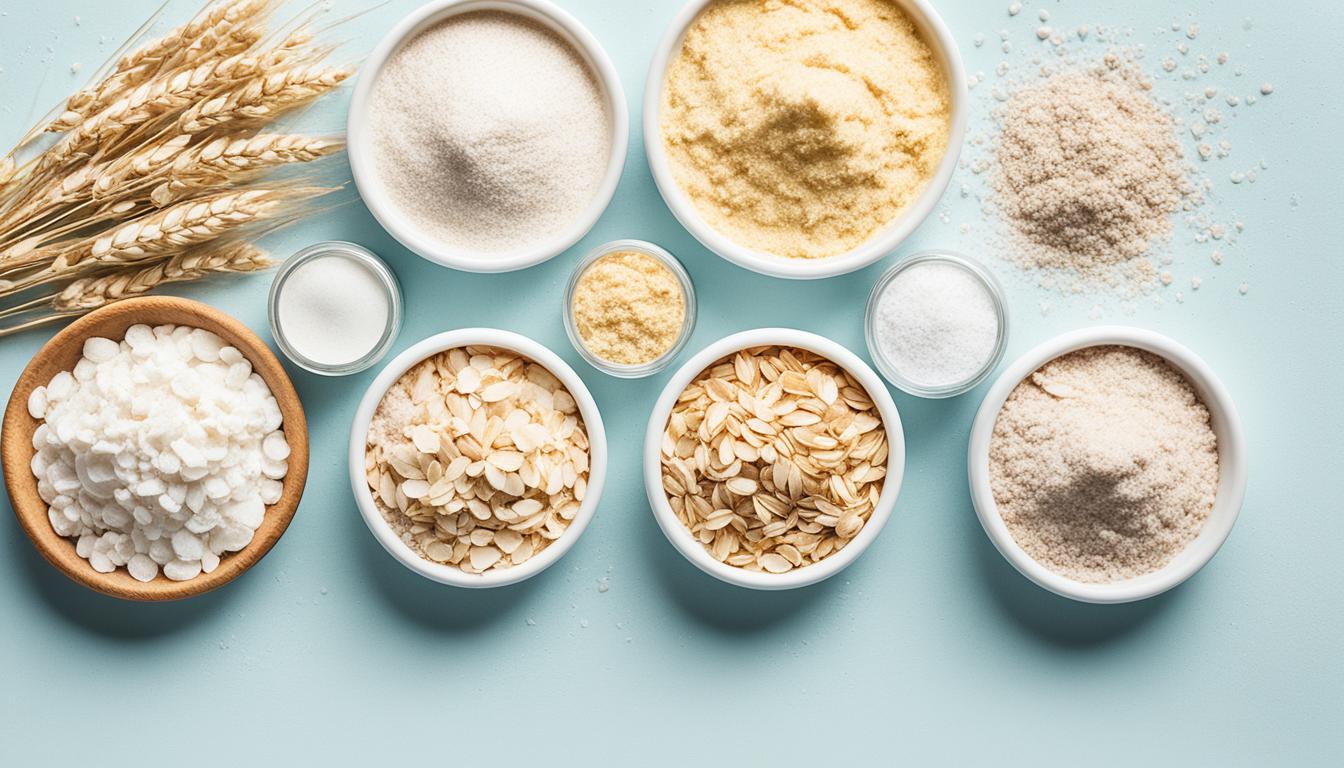
Finding the right exfoliant is key to having healthy, glowing skin. The best exfoliants vary based on your skin type and needs. If you have sensitive skin, go for gentle chemical exfoliants like those with lactic or glycolic acid instead of harsh physical scrubs.
For oily or acne-prone skin, salicylic acid-based products work well. They can get into pores and help control breakouts. Dry or mature skin might prefer moisturizing AHA exfoliants for extra nourishment.
Evaluating Exfoliant Options
When picking the best exfoliants, think about the difference between chemical vs physical exfoliation. Chemical exfoliants use acids or enzymes to break down dead skin cells. Physical exfoliants use rough particles or brushes to scrub away dirt.
- Chemical exfoliants, with alpha-hydroxy acids (AHAs) or beta-hydroxy acids (BHAs), are gentler and better for sensitive skin.
- Physical exfoliants, like scrubs with beads or granules, work well for oily or thicker skin that can handle stronger exfoliation.
Talking to a dermatologist or skincare expert can help find the best exfoliation for your skin type and needs. This ensures you get the best results for healthy, glowing skin.
“Proper exfoliation is the key to healthy, glowing skin. Finding the right balance and frequency is essential for each individual’s skin type and concerns.”
Exfoliation Frequency and Routine
For a healthy, glowing skin, a balanced exfoliation routine is key. The right exfoliation frequency depends on your skin type and condition. Experts suggest exfoliating 1-2 times a week as a good starting point.
How Often to Exfoliate
If you have oily or acne-prone skin, you might exfoliate 2-3 times a week. This helps clear out excess oil and unclog pores. But, if your skin is dry or sensitive, exfoliate only once a week. This prevents stripping away your skin’s natural oils.
Proper Exfoliation Techniques
Be gentle when exfoliating to avoid harming your skin. Use circular motions and light pressure to remove dead skin cells. After exfoliating, apply a moisturizer to keep your skin hydrated and protected.
Adding exfoliation to your skincare routine can make your skin look brighter and more radiant. By knowing your skin’s needs and using gentle methods, you can get a healthy, glowing look.
| Skin Type | Exfoliation Frequency |
|---|---|
| Oily/Acne-Prone | 2-3 times per week |
| Normal/Combination | 1-2 times per week |
| Dry/Sensitive | Once per week |
Listening to your skin and adjusting your routine is key to effective exfoliation. Finding the right balance helps you get a healthy, glowing complexion that boosts your confidence.
Exfoliation for Different Skin Types
Getting healthy, glowing skin means finding the right exfoliation for you. Your skin type and concerns will guide you. Exfoliation helps with dryness, aging, acne, and rosacea.
Exfoliation for Dry and Mature Skin
If you have dry or mature skin, try gentle exfoliants with alpha-hydroxy acid (AHA). These products keep your skin moist while making it look better. Look for exfoliants with lactic acid or glycolic acid to remove dead skin and brighten your look.
Exfoliation for Oily and Acne-Prone Skin
For oily or acne-prone skin, beta-hydroxy acid (BHA) products work well. Salicylic acid in these exfoliants goes deep into pores. It helps control oil and reduces acne and blemishes.
Exfoliation for Sensitive Skin
If your skin is sensitive, choose gentle exfoliants. Physical or enzymatic exfoliants are best. Enzymatic exfoliants use natural enzymes to gently remove dead skin, which is good for sensitive skin.
Talking to a skincare expert can help you find the best exfoliation for your skin. Whether it’s exfoliation for dry skin, exfoliation for oily skin, exfoliation for sensitive skin, exfoliation for acne-prone skin, exfoliation for aging skin, or exfoliation and rosacea, they can guide you. Exfoliation can be a key part of your skincare routine.
Also Read : How Can You Achieve Glass Skin Naturally?
Conclusion
Exfoliation is key for a good skin rejuvenation routine. It helps keep your skin healthy and bright. By getting rid of dead skin cells, your skin looks brighter and more radiant. It also helps reduce blemishes, keeps skin hydrated, and fights aging signs.
Knowing the different exfoliation methods and how to use them is important. It helps you get the best exfoliation benefits. Regular, gentle exfoliation can change how your skin looks and feels. It’s a must for a complete skin health plan.
The importance of exfoliation is huge. It’s vital for a young, bright, and skin radiance. Adding exfoliation to your skincare routine regularly can make your skin look amazing. It boosts your confidence and energy.
FAQs
Q : What is exfoliation and why is it important for skin?
Exfoliation removes dead skin cells from the skin’s surface. It keeps skin healthy and glowing by getting rid of dull, dry cells. This reveals smoother, brighter skin underneath. Regular exfoliation also helps with skin issues like blemishes, hydration, and aging signs.
Q : What are the benefits of skin exfoliation?
Exfoliation makes skin look healthy and glowing. It removes dead cells to show a brighter complexion. It also makes skin smoother, reduces pores, and clears out oil and dirt that can cause breakouts.
Exfoliation can fade dark spots and even out skin tone too.
Q : What are the different types of exfoliation?
There are two main types: physical and chemical exfoliation. Physical exfoliation uses tools or scrubs to remove dead skin. Chemical exfoliation uses acids like glycolic and salicylic to dissolve dead skin.
Q : How often should you exfoliate your skin?
How often to exfoliate depends on your skin type and condition. Generally, 1-2 times a week is good. If you have oily or acne-prone skin, you might exfoliate more. Dry or sensitive skin should exfoliate less often.
Q : How do you choose the right exfoliant for your skin type?
Pick an exfoliant that suits your skin type and needs. If you have sensitive skin, go for gentle chemical exfoliants. Oily skin does well with salicylic acid products. Dry or mature skin benefits from moisturizing AHA exfoliants.
Q : What are the best exfoliation techniques for different skin types?
The best exfoliation method depends on your skin type and concerns. Dry or mature skin does well with gentle, hydrating AHA exfoliants. Oily or acne-prone skin likes BHA products like salicylic acid. Sensitive skin should use very gentle physical or enzymatic exfoliants.

